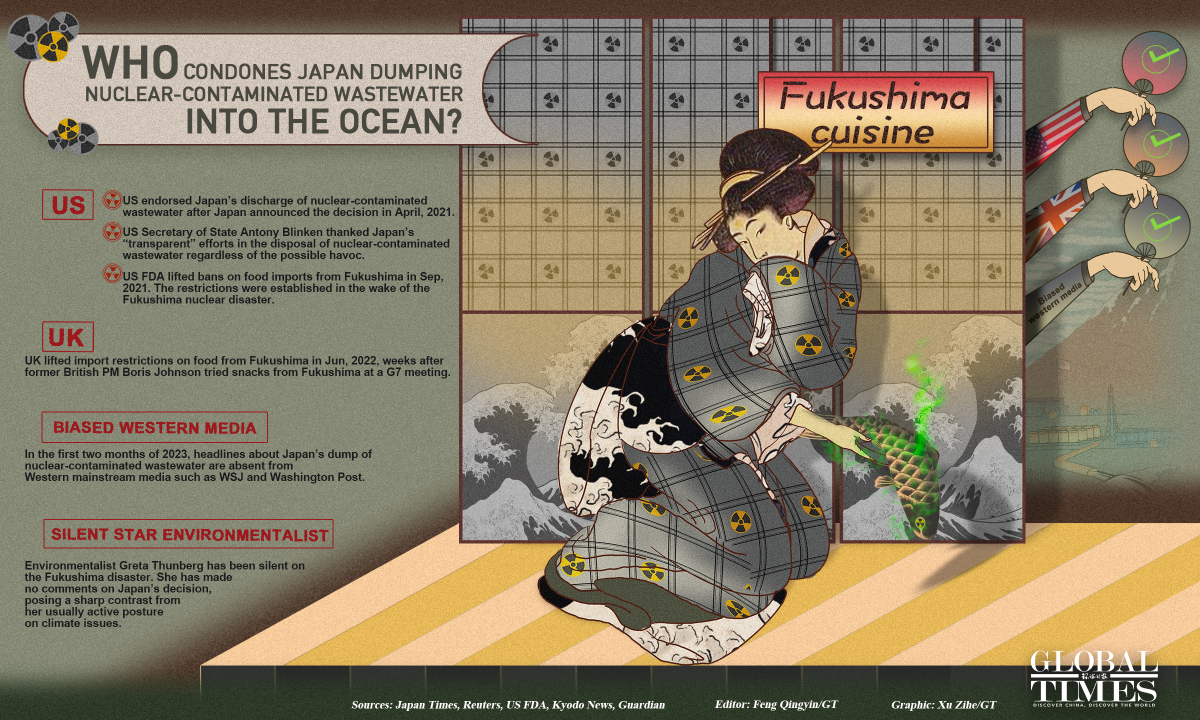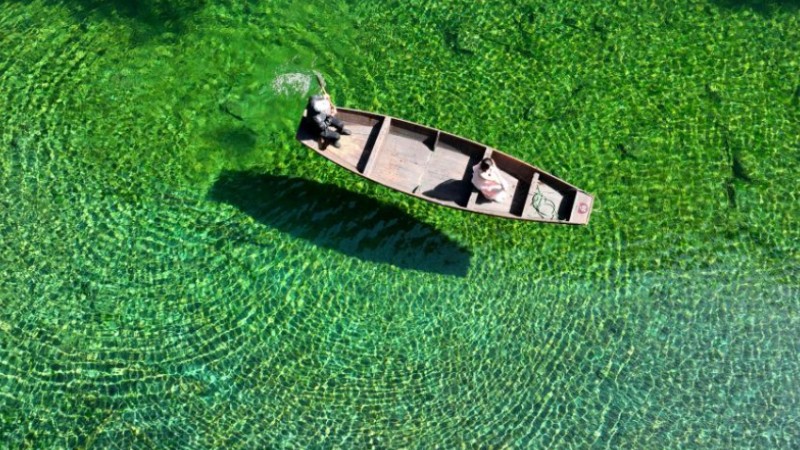Japan urged to address intl concern over radioactive wastewater dump

Japan plans to dump nuclear-contaminated wastewater into the sea despite widening international concerns. Among others, the US has endorsed Japan's decision regardless of the possible havoc. Editor: Feng Qingyin/GT Graphic: Xu Zihe/GT
Chinese officials, experts and industry representatives from Pacific Islands Countries (PICs) have voiced growing common concerns over Japan's unilateral decision to discharge nuclear-contaminated wastewater from the Fukushima Daiichi nuclear disaster into the Pacific Ocean. China, along with Russia, has presented a joint list of technical questions to Japan in November 2022, but the Japanese side has failed to answer either by distorting concepts, evading the crucial part or even refusing to talk about the matter, Chinese officials said.
Japan has made the decision in total disregard of the concerns and interests of people from China and other countries around the world, and we cannot neglect the harm caused by the dump, Sun Xiaobo, director-general of the Department of Arms Control of the Chinese Foreign Ministry, told a panel discussion held by the China Public Diplomacy Association on Thursday in Beijing.
An initial assessment shows that the nuclear-contaminated wastewater contains more than 60 radionuclides including tritium. Some long-life radionuclides may spread in the ocean currents and have a bio-concentration effect, causing unpredictable harm to the marine environment, Sun noted.
"The Japanese government should respond to the concerns of the international community and discharge the nuclear-contaminated wastewater in a responsible manner that is consistent with its international obligations," the Chinese official said.
The Japanese government is looking to begin releasing the nuclear-contaminated wastewater sometime this spring or summer, with operator Tokyo Electric Power Company Holdings Inc (TEPCO) asserting that the many large tanks holding treated water are obstructing work to decommission the defunct reactors, the Japan Today reported on Tuesday.
China has presented two lists of technical questions to the Japanese government, the second being a question list submitted jointly by China and Russia, Sun said.
The Global Times learned that there are a total of 36 questions on the joint list, including questions about nuclear-contaminated wastewater disposal and a radiological impact assessment report regarding the discharge of Advanced Liquid Processing System (ALPS) Treated Water into the sea.
Also, Chinese and Russian experts have studied most of the answers to the first list of questions from Japan dated July 20, 2022, and they believe that the Japanese side has failed to answer questions either by distorting concepts, evading the crucial parts or even refusing to talk about the matter.
For example, while the International Atomic Energy Agency (IAEA) has not reached a final conclusion, the Nuclear Regulation Authority (NRA) of Japan has approved the construction of dilution and discharge facilities for nuclear-contaminated water, which is a clear indication that the Japanese side has not seriously taken the review results of the IAEA Task Force as the basis for making its decision.
"Japan's discharge of the nuclear-contaminated wastewater into the ocean is just like releasing a giant, like a Godzilla, into the Pacific Ocean, which will definitely bring serious risk and danger to people around the world as well as the environment of the ocean," Li Chijiang, secretary general of the China Arms Control and Disarmament Association, told the panel.
It is well known that TEPCO has previously tampered with or fabricated data as well as hidden the truth,so the international community has enough reason to doubt and suspect the accuracy and reliability of the data related to the nuclear-contaminated water, Li noted.
"Many international experts believe that the independence and the verified variability of the data related to discharge are not satisfactory," he said.
As the discharge plan will impact countries on a broader scale, officials and experts from countries such as New Zealand and Papua New Guinea also voiced serious concerns.
"The nuclear waste as stated by the company is harmless. Why can't Japan utilize the water on their own land if they say it's safe? Why should we be the victims of circumstance for super powers who use these methods to improve their lives," Jelta Wong, Papua New Guinea's Minister for Fisheries and Marine Resources, told the Global Times via email on Thursday.
"Also, the scientific data is sketchy. On one hand they are saying that the radiation will not be fully eradicated. This means that some marine life can be affected. We all know that fish and marine life populate more than any other animal. Are we willing to take that risk? Short answer is no," Wong said.
Those who profit from nuclear technologies are responsible for managing the waste, rather than simply passing on the nuclear waste management responsibility to Indigenous peoples and others that are less geopolitically powerful, Dr Karly Burch, a sociology lecturer from the University of Auckland who has been studying the aftermath of the Fukushima Daiichi nuclear disaster for the past 12 years, told the Global Times on Wednesday.
On whether China would consider suing Japan at international court for dumping the wastewater, Sun said "we would like to see we don't have to go to that."
"It's very important for the Japanese government to listen to the concerns voiced by China, PICs and to make these decisions with the utmost prudence and not start the discharge of contaminated wastewater in the ocean unless all stakeholders, all neighboring countries are fully convinced that this is a safe revival plan," Sun told the Global Times on Thursday.
Japan's unilateral decision to discharge the nuclear-contaminated wastewater will bring damage and have a negative influence on the marine environment, which violates international law, and such a move could be considered an action backed by the country and they should take national responsibility, Chinese experts said.
"If indeed the Japanese government pushes forward with this plan, then we have to take what actions we need to take to prevent environmental disaster or foreseeable consequences," Sun said.
Photos
Related Stories
- China urges Japan to heed concerns of all parties on nuclear-contaminated water disposal
- Preserving int'l order key to China-Japan relationship for the new era: FM
- China urges Japan not to arbitrarily discharge nuclear-contaminated water
- China urges Japan to consult with stakeholders on nuclear-contaminated water discharge
- China urges Japan to responsibly dispose of nuclear wastewater: FM
- Chinese FM calls for win-win cooperation between China, Japan
- Chinese FM urges Japan not to choose beggar-thy-neighbor approach
- Chinese vice FM to visit Japan for bilateral dialogue, consultation
- Senior Chinese diplomat urges Japan act to improve ties
- China willing to work with Japan to deepen low-carbon cooperation: official
Copyright © 2023 People's Daily Online. All Rights Reserved.









